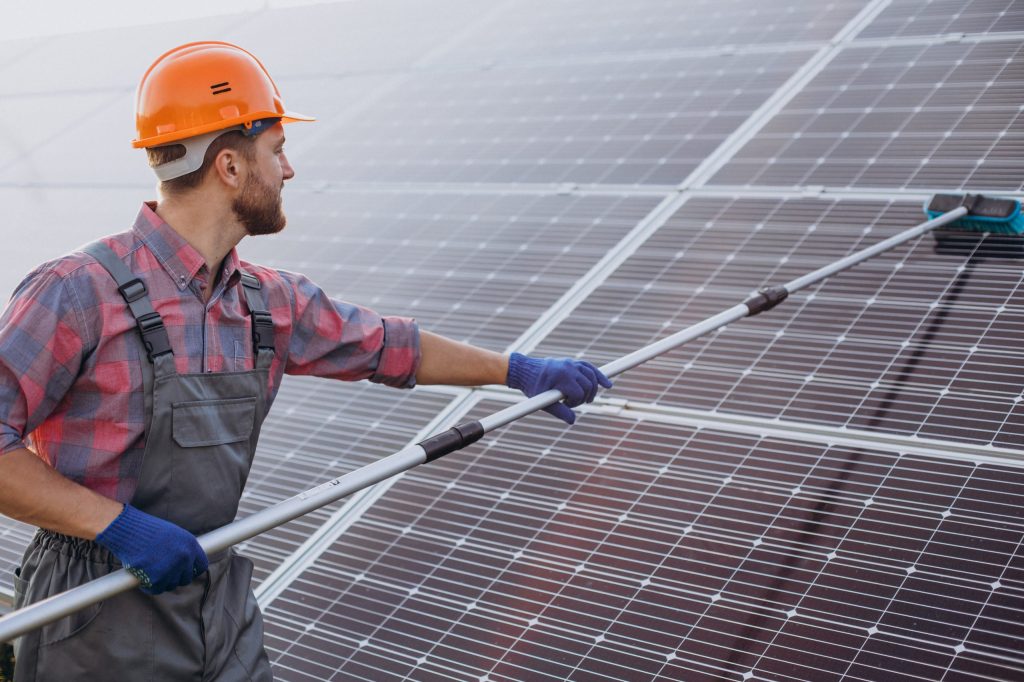If you’ve invested in solar panels, you’re probably expecting them to quietly crank out clean energy and lower your electric bill for years to come. And they will—but only if they’re kept clean.
What many homeowners and business owners don’t realize is that solar panels don’t just work on sunshine alone. Dirt, dust, pollen, bird droppings, and even air pollution can build up on the surface, blocking sunlight and reducing your system’s efficiency. That’s where regular solar cleaning comes in.
So, how often should you clean your solar panels? The answer isn’t one-size-fits-all. It depends on a number of factors—like your location, the angle of your roof, local weather patterns, and whether you’re managing a residential system or need commercial solar panel cleaning on a much larger scale.
In this guide, we’ll break it all down for you. You’ll learn how often your panels really need cleaning, what affects that timeline, and whether it’s better to DIY or hire a professional solar cleaning company. By the end, you’ll have a clear plan for keeping your panels in top shape—and your energy savings on track.
Why Solar Panels Need Regular Cleaning in the First Place
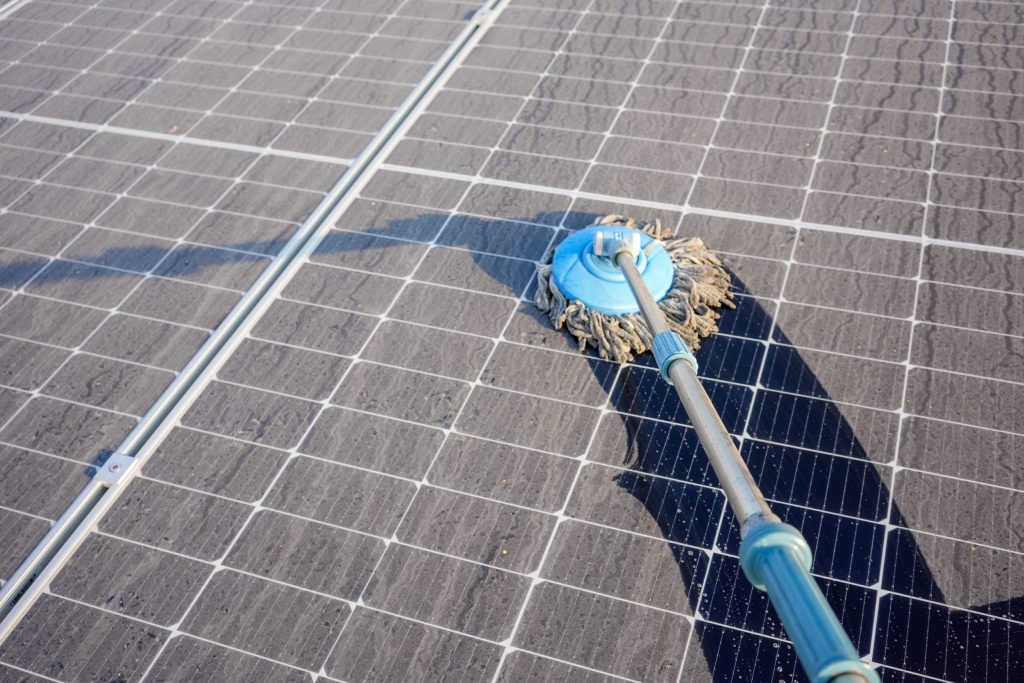
Let’s be honest—solar panels look like they should be maintenance-free. They’re up high, tilted at an angle, and exposed to the sun all day long. So naturally, a lot of people assume that rain will do the trick when it comes to cleaning them.
Unfortunately, that’s not the case.
While rain can rinse off some loose dust, it’s not nearly enough to tackle the sticky stuff—think bird droppings, pollen, pollution residue, or that fine layer of grime from nearby traffic or construction. Over time, these materials build up on the surface of your panels and block the sunlight that your system needs to generate power. The result? Reduced efficiency and a drop in energy savings.
According to multiple industry studies, dirty panels can lose up to 20–30% of their output, depending on the environment and how long it’s been since their last cleaning. That’s a pretty steep cost for something as simple as skipped maintenance.
This is where solar cleaning makes a big difference. By removing that buildup regularly, you allow your system to absorb more sunlight and operate closer to its peak potential. Whether you’re managing a small home setup or a large commercial array, keeping panels clean helps protect your investment—and keeps those electric bills nice and low.
Bottom line: solar panels aren’t self-cleaning. Like your car windshield or windows, they need attention. And regular solar cleaning is one of the easiest ways to ensure you’re getting the most out of your solar energy system.
How Often Should Solar Panels Be Cleaned? General Guidelines
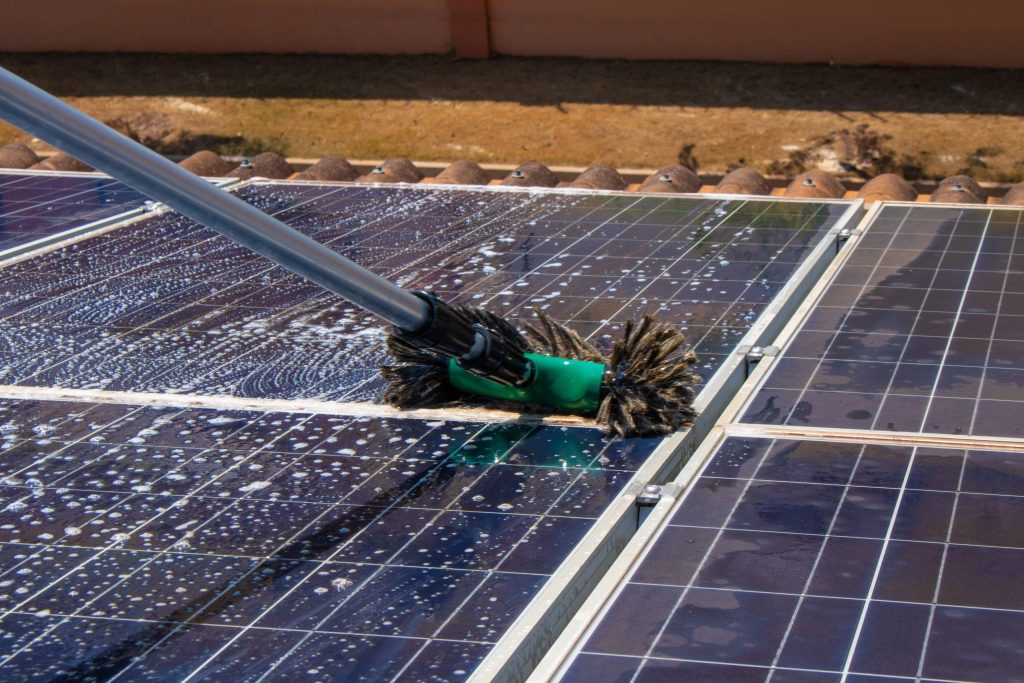
Now that we’ve covered why solar cleaning matters, let’s talk about how often you should actually do it. The short answer? It depends—but there are some good rules of thumb to start with.
For most residential systems, solar panels should be cleaned about once every 6 to 12 months. That’s enough to prevent buildup from reducing efficiency without overdoing it. However, if your home is near a busy road, under a lot of trees, or exposed to frequent dust (like in construction zones or dry, windy areas), you might want to clean more often—think every 3 to 6 months.
If you’re managing a larger system, such as on a warehouse, office building, or solar farm, you’ll likely need a different approach. Commercial solar panel cleaning often follows a stricter schedule—sometimes quarterly—because even a small dip in output across hundreds of panels can mean serious losses in energy production and profit. Plus, commercial panels tend to sit flatter, which makes it easier for debris to settle and stay.
Weather also plays a big role. In drier climates, dust accumulates quickly. In areas with lots of rain, pollen and pollution can still cling to panels. Even if you live somewhere that gets a good amount of rain, it won’t always rinse off sticky contaminants.
Not sure what schedule makes sense for your setup? It’s a smart idea to reach out to a professional who specializes in commercial solar panel cleaning or residential maintenance. They can assess your location, panel angle, and environmental factors to recommend a custom cleaning plan that keeps your system running efficiently year-round.
Remember, solar panels are built to last—but only if they’re taken care of. Regular cleaning is a small effort with big rewards.
Key Factors That Affect Cleaning Frequency
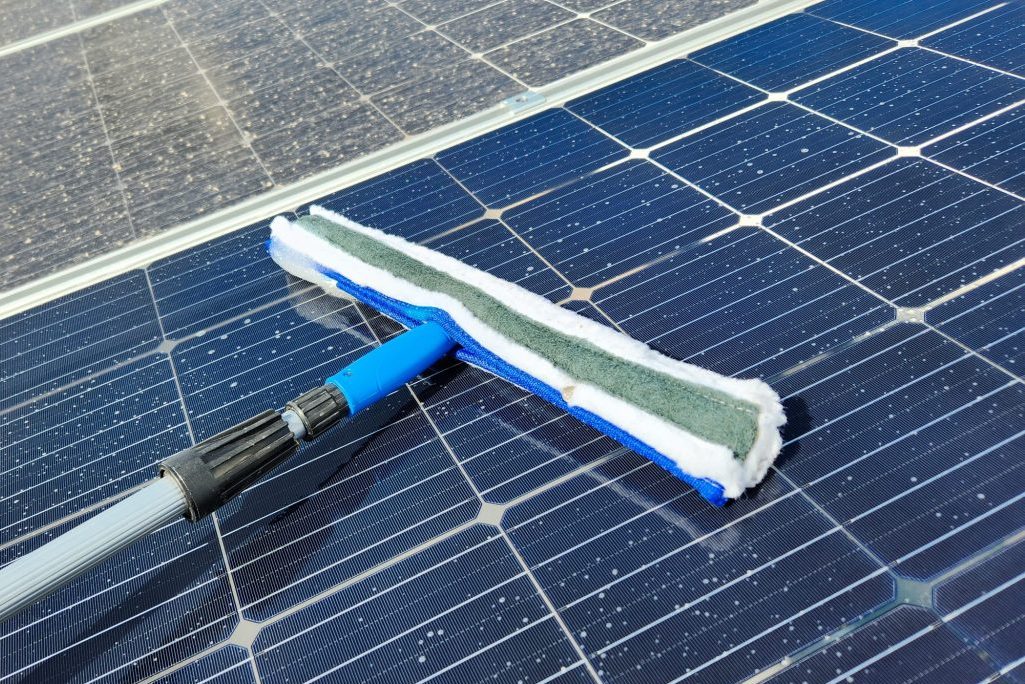
So, how do you know if your solar panels need cleaning more often than the average recommendation? The answer lies in your environment. There are a handful of key factors that can either speed up grime buildup—or help keep your panels looking (and performing) better for longer.
1. Location, location, location
If you live in a dry, dusty region or near open fields, expect more frequent cleanings. Dust and dirt settle quickly and stick around—especially if you’re not getting regular rain. Urban areas can also be tough on solar panels due to air pollution and soot.
2. Angle and tilt of your panels
The steeper your panels are angled, the more likely rainwater can help rinse off debris. Flatter panels, on the other hand, tend to collect dust and water spots, which don’t just disappear on their own. These flat installations often benefit from more frequent cleanings—and that’s where professional solar panel cleaners can help keep buildup under control.
3. Nearby trees and wildlife
Have overhanging branches? You’ve probably also got sap, pollen, and—let’s be honest—bird droppings. These can seriously affect energy output and don’t wash off easily. If you’re in a leafy or bird-heavy area, you’ll want to clean your panels more regularly.
4. Time of year
Spring and fall tend to bring more pollen, leaves, and organic material that can coat your panels. Summer can lead to baked-on dust, while winter may bring salt and grime from snowmelt. Seasonal changes can throw curveballs, so be aware of what’s happening on and around your panels throughout the year.
By keeping these factors in mind, you can adjust your cleaning schedule and avoid performance dips. If you’re unsure or just want peace of mind, hiring reliable solar panel cleaners ensures your system stays efficient without the guesswork.
DIY Solar Cleaning vs. Hiring a Professional
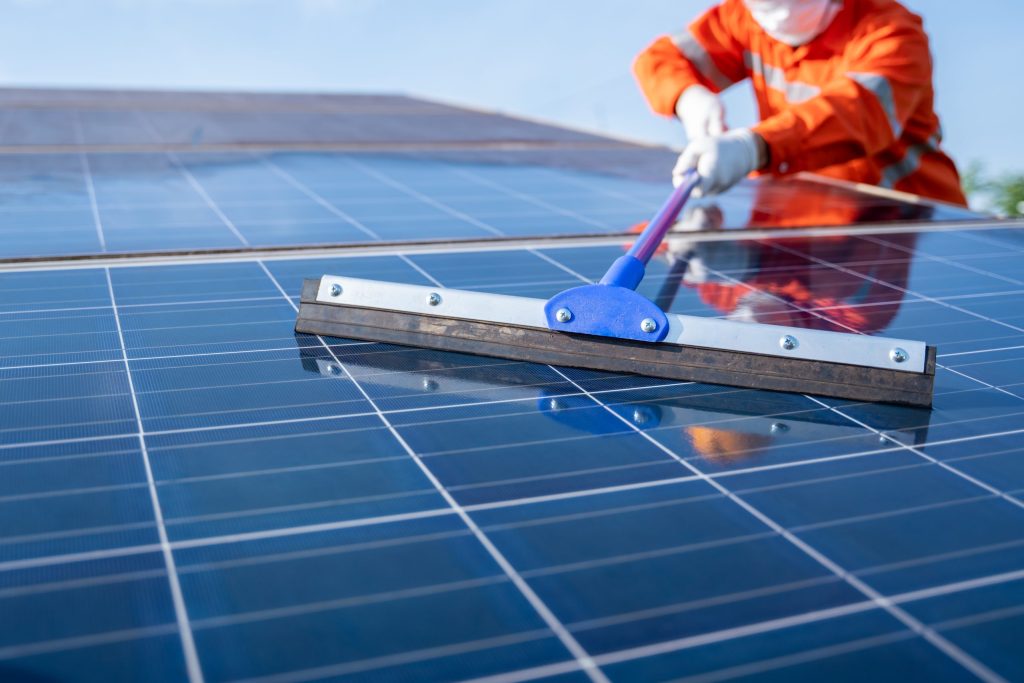
When it comes time to clean your solar panels, you’ve got two options: do it yourself or bring in the pros. Both approaches can be effective—but which one is right for you depends on your setup, comfort level, and how much time you’re willing to spend up on a ladder.
If you’re tackling a basic residential system and your panels are easy to reach, DIY solar cleaning might be a good fit. With a soft brush, a squeegee, and some distilled water, you can remove most of the surface dirt without much trouble. Just remember: no harsh chemicals, no abrasive pads, and definitely no pressure washers. The goal is to clean without scratching the surface or damaging the wiring underneath.
That said, DIY isn’t for everyone. If your panels are on a steep roof, mounted high up, or part of a large system, hiring a solar cleaning company is not only safer—it’s smarter. Professionals have the right tools (like deionized water systems and telescopic brushes) to clean thoroughly without leaving streaks or causing wear. They also know how to clean without voiding warranties, which can be a risk if the wrong products or techniques are used.
Another benefit? A professional solar cleaning company can often spot issues you might miss, like microcracks, panel misalignment, or signs of wear in the mounting hardware. Think of it as both a cleaning and a mini check-up for your system.
So while DIY might save a little money upfront, hiring a trusted pro can save time, reduce risk, and help your system perform better long term. It’s all about what works best for your specific setup—and your peace of mind.
What to Look for in a Solar Cleaning Company
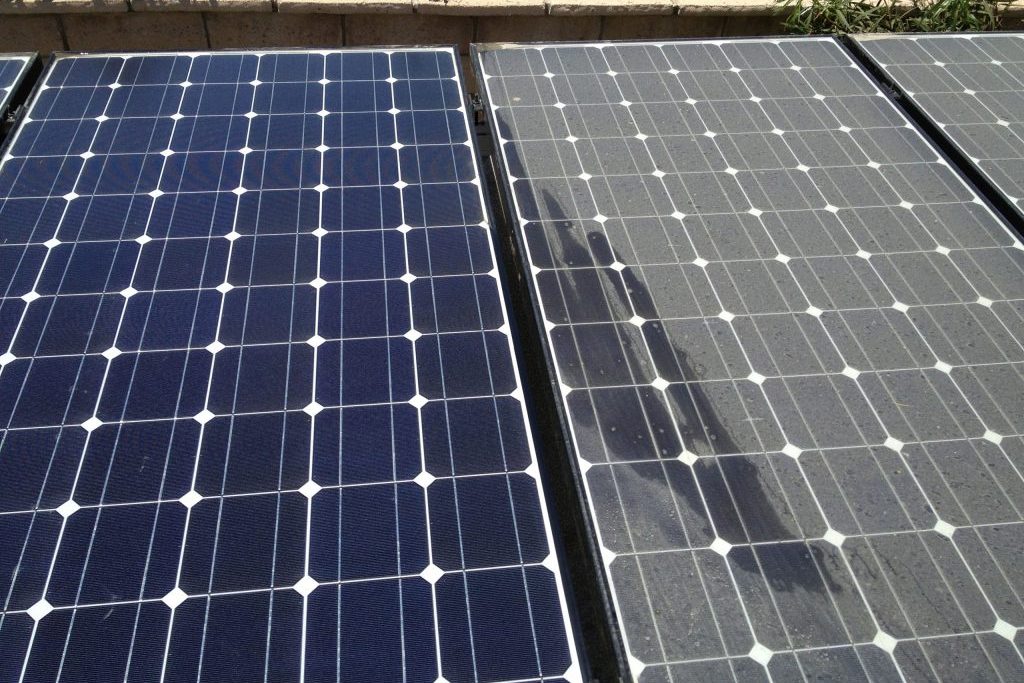
Not all solar cleaning services are created equal. If you’re hiring a professional, you want to make sure they’re not just spraying down your panels and calling it a day. A reputable solar cleaning company should offer both expertise and care.
First, look for experience—especially with both residential and commercial systems. The more types of panels they’ve handled, the more confident you can be in their process. They should use the right tools, like soft brushes and purified water systems, and avoid harsh chemicals that can damage panel coatings.
Ask if they’re insured, and find out whether their methods maintain your solar warranty. A professional company should also be willing to explain their process, provide before-and-after photos, and offer a basic performance check while they’re at it.
If you’re managing a large system, like at a business or facility, ask if they offer commercial solar panel cleaning packages—these often include routine scheduling and system monitoring.
At the end of the day, hiring the right solar cleaning company means better performance, longer panel life, and peace of mind—without you needing to climb a ladder.
Keep Your Panels Clean, Keep Your Power Strong
Solar panels are a smart investment—but like any investment, they need upkeep to perform at their best. Regular solar cleaning isn’t just about appearances; it directly impacts how much energy your system produces and how long it lasts.
From understanding how often to clean, to knowing what affects that schedule—like your location, panel angle, and surrounding environment—you’re now equipped to keep your panels in peak condition. Whether you go the DIY route or hire a professional, staying consistent with maintenance helps you get the most out of your system year-round.
And if climbing up on your roof isn’t your thing? No problem. A trusted solar cleaning company can handle the dirty work for you—safely, efficiently, and without putting your warranty at risk.
Ready to boost your solar performance and protect your investment? Reach out to experienced solar panel cleaners in your area, or explore our resources for more tips on solar care and system optimization.
Because when your panels shine, so do your energy savings.

